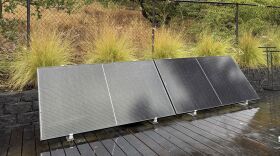Gov. Josh Green has entered Hawaiʻi into an agreement with JERA, Japan’s largest energy company, to move ahead with a plan to import liquefied natural gas to power Oʻahu’s grid.
In a statement, Green’s office said the agreement "establishes a framework for collaboration among JERA Co., Inc., JERA Americas Inc. and the state of Hawaiʻi" to advance "clean energy initiatives recommended in the Alternative Fuels, Repowering and Energy Transition study." He signed it on Oct. 6 while in Japan.
That study, prepared by the Hawaiʻi State Energy Office and released in January, suggested that Oʻahu could reduce its dependence on oil by swapping it out with liquefied natural gas.
Both sources of energy are fossil fuels. Hawaiʻi is required by state law to stop using fossil fuels for power generation by 2045.
More than $2 billion would need to be invested into Oʻahu's energy infrastructure to power the grid with natural gas, according to the study. In order for the investment to be worthwhile, the infrastructure would also need to be able to run on an alternative zero-carbon fuel source like hydrogen after 2045.
Hawaiʻi Chief Energy Officer Mark Glick said that as part of its new agreement with the state, JERA will be taking steps to line up that capital.
JERA is one of the largest traders of liquefied natural gas. In June, JERA announced plans to purchase 5.5 million tonnes of LNG annually from the U.S. over the next 20 years.
Glick said the state's agreement does not commit the state to purchasing LNG from JERA.
Opponents of HSEO's proposal to import LNG have said that it is inconsistent with the state's climate goals and that investments should be focused on renewable sources of energy like solar.
Glick said that LNG can be a part of Oʻahu's energy mix in a way that’s compatible with state law.
"If it's necessary, we'll build regulatory and legal guardrails to ensure that we do not backslide on our renewable objectives," he said.
Read a full copy of the agreement here.





